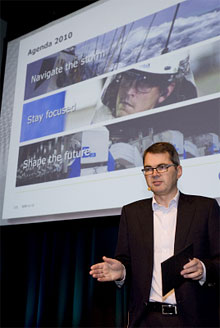May 3 2010
"The biggest transaction in Hydro's history lays the foundation for growth with a 100-year perspective," says Hydro's President and CEO, Svein Richard Brandtzæg. The agreement to acquire Vale's Brazilian aluminium operations gives Hydro greater strength throughout the value chain - around the world.
"The acquisition in Brazil will secure raw materials for more than a hundred years of aluminium production. This gives the entire company greater strength, makes us more robust. At the same time, we will be transformed from a company with its center in Europe to a leading global aluminium concern with production and market positions in the Americas, Australia, Europe and the Middle East," says Brandtzæg.
The potential for further activities in Asia and South America has been substantially strengthened.
 COOPERATION: “With 40 years of cooperation with Vale behind us, we know what we’re buying. Along with the physical assets, we’re getting 3,600 skilled employees for whom we have the greatest respect,” Svein Richard Brandtzæg says. (Photo. Kåre Foss)
COOPERATION: “With 40 years of cooperation with Vale behind us, we know what we’re buying. Along with the physical assets, we’re getting 3,600 skilled employees for whom we have the greatest respect,” Svein Richard Brandtzæg says. (Photo. Kåre Foss)
Long cooperation bears fruit
The year 2010 started well both for Hydro and the chief executive. The contrast to 2009 couldn't be greater. In the course of just a month, the gigantic aluminium plant Qatalum in Qatar officially opened and now an acquisition abroad without precedent in Hydro's - or Norway's - history.
Both the opening of Qatalum and the agreement with Vale are the fruits of long and close cooperation.
Brandtzæg doesn't even try to hide his immense satisfaction with the agreement signed in Oslo on Sunday. Both he and Vale's President and CEO Roger Agnelli played an active role, sitting at the negotiating table during the most intense phase of the deal.
Very demanding negotiations
"I won't deny that the negotiations reflected how much was at stake for both companies," he says. "But they were helped along by a very capable and determined negotiating team and the mutual respect that has been built up through a partnership that has been fruitful for both parties since back in 1974.
"The negotiations were the most demanding I have ever been involved in, and in the most exciting and challenging phase it was just impossible to not think about it. This was a unique opportunity, a decisive building block in developing Hydro further. So it is very satisfying to have come to an agreement."
Entering a new phase
Now Hydro and the partnership with Vale are entering a new phase. Hydro today has a 34-percent stake in the world's largest and most efficient alumina refinery, Alunorte. The refinery is operated by Vale, which owns a 57-percent stake.
Alunorte is a very important part of Vale's aluminium operations, which also includes large stakes in bauxite mines and 51 percent of the aluminium plant Albras, which with its annual production capacity of 460,000 tonnes is Brazil's largest. Under the agreement, all of Vale's interests in these operations will 100-percent owned by Hydro, while Vale will become Hydro's second-largest owner, with 22 percent of the shares in Hydro.
"With 40 years of cooperation with Vale behind us, we know what we're buying. Along with the physical assets, we're getting 3,600 skilled employees for whom we have the greatest respect. Vale has operated the bauxite mines, alumina refinery and aluminium plant at a level that places them among the best in class," he says.
Closer to our roots
"Even though Brazil is far from Hydro's home and the company hasn't been involved in mining of any size for many years, this acquisition brings us back closer to our roots. It's in our genes and it's our mission: We're going to 'create a more viable society by developing natural resources and products in innovative and efficient ways,' " says Brandtzæg.
"Now Hydro's value chain as an integrated aluminium company is about to become complete. Not that we feel that we are finished developing. All of the important links are in place, but we have a lot of room for development and further improvements in every one of them."
Development with respect
"Something else that's in our genes is that we are going to operate and develop our operations with respect for nature, which we are dependent upon, the people working in the company, and everyone who one way or another is affected by our activities. This will be even more important and more challenging when we go directly into mining operations in a sensitive rainforest region.
Brandtzæg emphasizes that we will take to heart the lessons Vale has learned.
"The organization takes safety, order and good housekeeping as high priorities that are integrated into good operations. I believe the two companies' organizations have a lot to share with each other and can challenge each other. At the same time, there is an opportunity and an important duty for us to help further develop Vale's organization. It's our ambition to be technological leaders in all important parts of the value chain, including in alumina refining," says Brandtzæg.